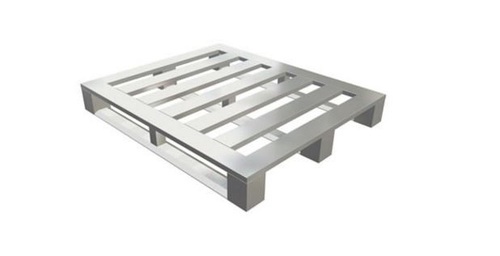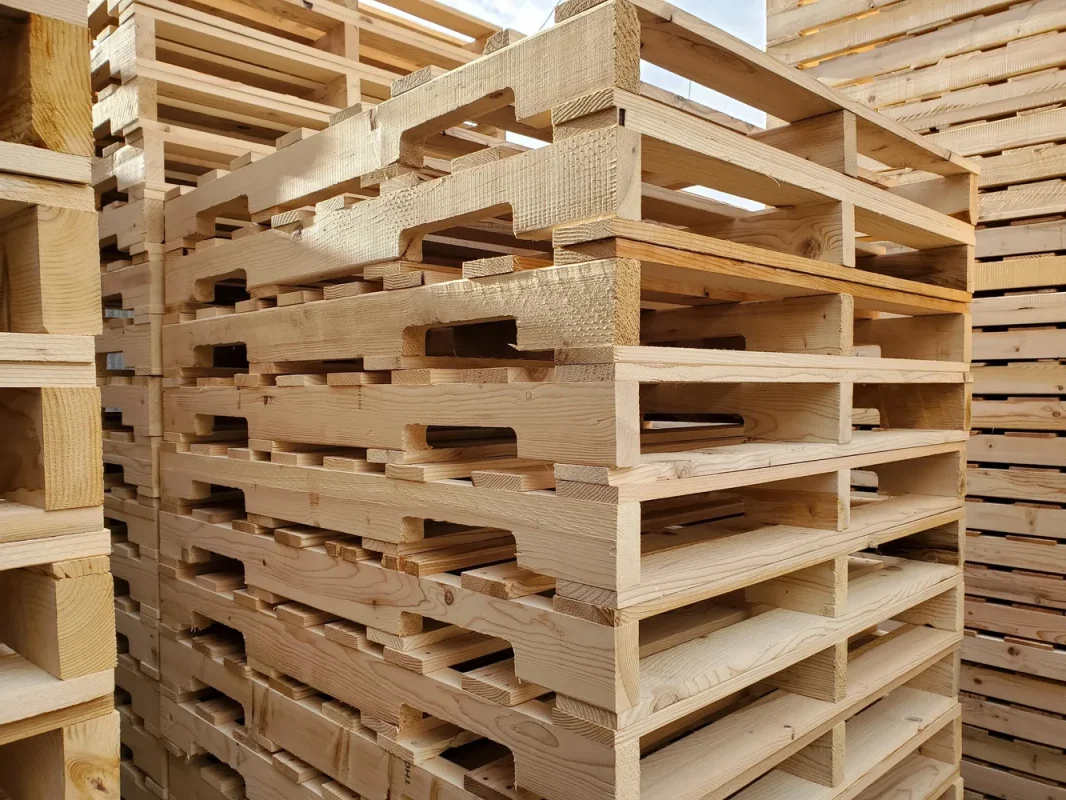Custom aluminum pallets are a special kind of pallet because of a few unique characteristics that set them apart from other types. They have numerous excellent characteristics that distinguish them from other types of pallets. In this artcile we’ll describe them and how to handle them.
Exchange from wooden to custom aluminum pallets
This solution is capable of exchanging loads from wooden pallet to aluminum pallets.
Caracteristics of custom aluminum pallets
Some of the properties of aluminum are:
- Lightweight
- Very strong by design
- Does not rust or rot
- Never gets infested with insects and bacteria
- Completely fireproof
- Reduce your cost of insurance
- Can also be recycled
- Anti-magnetic
- Convenient to use
- Highly corrosion resistant
- Long life
- Smooth surface
- Easy to scrub
Therefore, you can find the application of custom aluminum pallets in food and pharmaceutical companies.

How custom aluminum pallet emerged as material?
Generally, pallets are used for the transportation of goods so that it becomes convenient to lift them by using a forklift instead of using any manual labor. This can reduce your loading time and also operational efficiency can be improved.
There are many other types of materials also used for pallets. Some of the common materials are:
- Wood
- Plastic
- Aluminum
- Stainless steel
- Steel
As internet technology is rapidly developing and hence most of the logistics industries are trying to increasingly make use of pallets in the logistics industry.


A few years back, wood was considered to be the preferred material for pallets. However, with increased deforestation people are now trying to avoid using wood for making pallets. As a result, custom aluminum pallets are increasingly coming an alternate material for pallets.
Due to various advantages offered by aluminum nowadays aluminum is emerging as a first choice as a pallet material.
Most aluminum pallets use a high-strength variety of aluminum and such aluminum can offer an unmatched property as compared to all other materials. Aluminum generally used for pallets is chosen based on the following profiles:
- Good plasticity
- Excellent corrosion resistance
- No cracking due to stress
- Good welding performance
Custom Aluminum pallets versus wood pallets
Over the last few years, there was a lot of debate among users about the use of pallets and which material to select for pallets, etc. Particularly for the manufacturers of wooden pallets and plastic pallets, there was a clash of interest.
For the last few years, sustainability is another issue that has turned out to be a hot topic and has become a very important thing to consider. As a result, many laws and regulations have been introduced on pallets that are used while shipping products internationally.
Many companies have identified the benefits of using tough plastic pallets. However, the issue is, durable HDPE pallets were not found very suitable for all kinds of businesses.
Also, a few production facilities that needed a large number of products to be shipped internationally was not in a position to use wooden pallets of a such high number.
Therefore, metal pallets were introduced to overcome this restriction as a shipping solution. That is because, wooden pallets can hold a load of a maximum of 2500 lb. while any reusable plastic pallet can go up to 25,000 lb.
Metal pallets can further increase the weight-bearing capacity by double. As a result, aluminum pallets have been introduced as a viable option.
Let us list out the pros and cons of using wooden pallets:


Pros Wooden pallets
- Wooden pallets can be reused approximately 30 times without any major problems
- They can be easily repaired
- Wood is a cheaper material and easily available
- Pallets can be made at a low cost
Cons Wooden pallets
- Wood shipping pallets will retain moisture.
- Wood pallets can be contaminated due to bacteria contamination.
- Traditional wood pallets will harbor insect infestations.
- Wooden pallets holding the hardware can get damaged.
- Load bearing capacity is restricted.
Now let us see the pros and cons of aluminum pallets:
Pros Costum Aliminum pallets
- Re-ordering of pallets will not be needed
- No issues will arise with the regulation of international shipping
- Lighter-weight aluminum pallets will reduce shipping cost.
- There will be no issues with fire hazard.
- No chance for any bacterial contamination of products.
- Aluminum pallets can also help reduce your carbon footprint.
- Can easily be sanitized
- Easy to clean
- Less prone to damage during transportation
Cons Costum Aliminum pallets
- Comparatively aluminum is a much costlier material
- Cannot be easily modified.
Classification of custom aluminum pallets
According to the usage of pallets, there can be a few classifications of pallets. Pallets can be classified based on the following:
- Pallet material
- Usage
- Tabletop
- Fork-in method
- Structure of the forklift
Often pallets are needed for fast operation, and because of the safety, high efficiency, and stability of the operation of pallets many countries have come out with many different types of special pallets. Some of them are:
- Container trays of flat glass
- Long-sized trays for object
- Special tires trays
- Special trays meant for oil drums
Due to the availability of special varieties of pallets that have got a wide range of applications, they can influence the handling of various logistics related to:
- Loading and unloading
- Storage
- Transportation
- Packaging
Although the pallet is not a very big appliance, its size will determine the package, carriage, and container unit size. Here only the size of the pallet is the standard for deciding the following:
- Supporting specifications
- Serialized specifications of packaging,
- Truck carriages
- Train carriages
- Container boxes.
Let us try to understand a few pallets load definitions.
-
Static capacity
When a pallet is put on a hard, horizontal surface with its contents evenly distributed, the term “static load” is used to describe the maximum weight of the load that the pallet can support.
-
Dynamic capacity
When employing forklifts and other handling equipment, the term “dynamic load” refers to the maximum load weight that can be supported when the pallet is in dynamic operation and the items on the pallet are distributed equally.
-
Racked capacity
This relates to the heaviest load that a pallet can support when it is placed on a beam shelf or another equivalent material rack and its contents are distributed equally.
Therefore, when you are selecting the load capacity of your pallet, you must understand the pallet’s use function. When you are going to store the pallets on the shelf then the shelf load becomes the most important criterion.
You need to consider the pallet’s load capacity while considering the placement of your goods on the pallet. The load area may be reduced, and instead of your original rated load, the pallet’s actual residual load will also be reduced.
